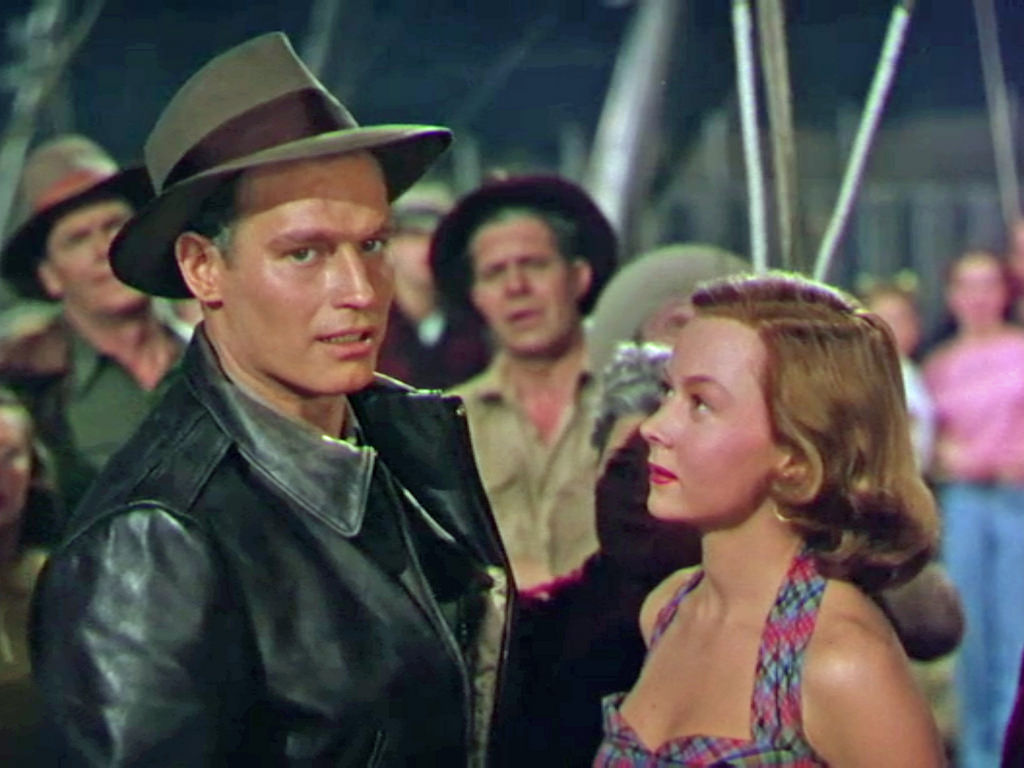Film Review: The Greatest Show on Earth (1952)

The narration that opens The Greatest Show on Earth, and pops up periodically throughout, is provided by Cecil B. DeMille himself. The circus, he explains, is “a mechanized army on wheels that rolls over any obstacle in its path,” and “A fierce, primitive fighting force that smashes relentlessly forward against impossible odds.” Without proper context, you might think he was describing the allied invasion of France.
DeMille’s film won Best Picture at the 25th Academy awards in 1953, upsetting High Noon, which was considered the favorite. It also has the lowest Rotten Tomatoes score of any Best Picture winner, and for good reason. At best it’s hokey, overacted, and excessively sentimental towards an exploitative industry. At worst it’s racially insensitive and cruel to animals. I admit I viewed the film through 21st Century eyes, and that, in 1952, racial insensitivity and animal cruelty weren’t high on the list of no-nos, but when characters joke about “blackface” and you can literally see elephants being dragged into train cars, a line must be drawn. This type of glorification doesn’t sit well with me.
Aside from the viler aspects of circus life, The Greatest Show on Earth simply doesn’t tell a very compelling story. Subplot after subplot is crammed into its bloated 152-minute running time that is hastily and thinly resolved at the last minute. There are characters all over the place who are in and out of love with each other so quickly that it’s impossible to keep up. By the end, I’m not even sure who ended up with who, or why—and I don’t think I care. The only plot point I found interesting was the one concerning the mysterious clown, Bubbles (psst, it’s Jimmy Stewart under the make-up). At least he killed somebody for some reason and was wanted by the law. You’d think DeMille would have made a bigger deal out of that, but it’s treated as a passing fancy with no impact on the story whatsoever—as is everything else.
Charlton Heston plays Brad, the manager of the huge war-machine of a circus. He’s in love (I think) with Holly (Betty Hutton), the show’s star aerialist. Things get dicey when the brass want to cut the show’s road time to a 10-week stretch, forcing Brad to bring in a hotshot performer named The Great Sebastian (Cornel Wilde) to fill the seats and keep the circus going for the full ride. Tempers flare and love triangles form (or rectangles, or hexagons, I’m not sure). Eventually, one of the acts has a bad accident and things get even dicier for the troupe and love interests. There’s also something about a sore midway carnie who Brad threw in the mud for running a crooked game. Such is circus life, I guess.
Heston’s embellished acting style works fine (even great) when he’s casting down plagues onto the Pharaoh, or running around half naked with a bunch of talking apes, but here, not so much. He just seems angry or drunk most of the time. I’m at a loss as to why any of the women on the tour would have found the ornery S.O.B. desirable in any way, but they all do. He’s considered a “catch” by all the gals. The rest of the cast isn’t much better. Hutton is constantly complaining about this or that. Wilde’s Sebastian nearly works. He’s at least likable, but too ridiculous to be taken seriously. Even Stewart is bad—and when that happens, you know something’s wrong.
Things do ramp up in the climactic train collision scene (the miniatures are hilariously bad—watch for the poor tiny body in the car), but it’s not nearly enough to save the movie. Had it ended there, I would have let out a triumphant cheer, as that would have been an amazing way to finish a bad movie. Instead, it plods into an exploitive “the show must go on” routine that would give OSHA a heart attack. Wounded and bandaged carnies are forced by their taskmaster to perform and fulfill their duties only moments after a devastating train crash. Brad, how dare you!

